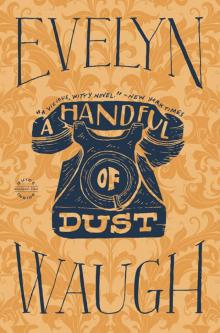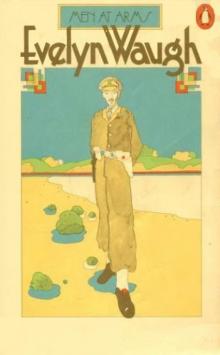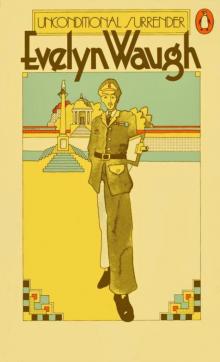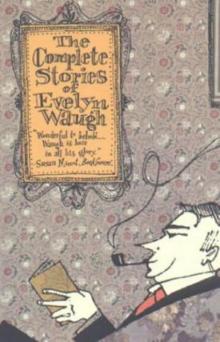- Home
- Evelyn Waugh
When the Going Was Good Page 2
When the Going Was Good Read online
Page 2
I wonder. And I wonder whether she will add this book, and with it this anecdote, to her collection of my brother’s works by the side of her bed.
My next move was to Monte Carlo, where I had arranged to join a ship called the Stella Polaris.
I had decided to get out at Monaco because, I was told, the hotels were cheaper, and it would be more convenient for boarding the ship.
The station at Monaco is very small and unpretending. The only porter I could find belonged to an hotel with a fairly reputable-sounding name. He took my suitcase and led me through the falling snow, down the hill to his hotel. It was a pension in a side street. There was a small lounge full of basket chairs in which elderly Englishwomen sat sewing. I asked the porter whether there was not a better hotel at Monaco. Why, yes, he said, all the hotels in Monaco were better than this one. So he picked up my suitcase again and we went out into the snow, pursued by a manageress, and soon reached a larger hotel facing the harbour.
After luncheon the snow stopped, and the afternoon turned out intensely cold but bright and clear. I took a tram up the hill to Monte Carlo. The sound of firing came from the bastion below the promenade where ‘Tir aux Pigeons’ was advertised. Some kind of match was in progress; the competitors were for the most part South Americans with papal titles. They made very interesting gestures with their elbows as they waited for the little cages to collapse and release the game; they also had interesting gestures of vexation and apology when they missed. But this was rare. The standard of marksmanship was high, and while I was there only three birds, fluttering erratically with plucked tail and wings, escaped the guns, to fall to the little boys below, who wait for them on the beach or in rowing-boats and pull them to pieces with their fingers. Often when the cages fell open the birds would sit dazed among the débris, until they were disturbed with a bowl; then they would rise clumsily and be brought down, usually by the first barrel, when they were about ten feet from the ground. On the balcony above the terrace sat one of the Casino pigeons, privileged and robust, watching the destruction without apparent emotion. The only convincing recommendation which I heard of this sport came from one of the visitors at the Bristol who remarked that it was not cricket.
There was a heavy fall of snow every night I was at Monaco, sometimes continuing nearly until midday, but always, within an hour of it stopping, every trace had disappeared. The moment that the last flake had fallen there appeared an army of busy little men in blue overalls armed with brooms and hoses and barrows; they sluiced and scraped the pavements and brushed up the lawns; they climbed up the trees with ladders and shook down the snow from the branches; the flower beds had been overlaid with wire frames, straw, and green baize counterpanes; these were whipped off, revealing brightly flowering plants which were replaced, the moment they withered in the frost, by fresh supplies warm from the hot-houses. Moreover, there was no nonsense about merely tidying the unseemly deposit out of the way; one did not come upon those dirty drifts and banks of snow which survive in odd corners of other places weeks after the thaw. The snow was put into barrows and packed into hampers and taken right away, across the frontier perhaps, or into the sea, but certainly well beyond the imperium of the Casino.
The arrival of the Stella Polaris caused excitement. She came in late in the evening, having encountered some very heavy weather on her way from Barcelona. I saw her lights across the harbour and heard her band faintly playing dance music, but it was not until next morning that I went to look more closely at her. She was certainly a very pretty ship, standing rather high in the water, with the tall, pointed prow of a sailing yacht, white all over except for her single yellow funnel.
Every Englishman abroad, until it is proved to the contrary, likes to consider himself a traveller and not a tourist. As I watched my luggage being lifted on to the Stella I knew that it was no use keeping up the pretence any longer. My fellow passengers and I were tourists, without any compromise or extenuation.
The Stella Polaris is a Norwegian-owned six-thousand-ton motor yacht, carrying, when full, about two hundred passengers. As one would expect from her origin, she exhibited a Nordic and almost glacial cleanliness. I have never seen anything outside a hospital so much scrubbed and polished. She carried an English doctor and nurse; otherwise the officers and crew, hairdresser, photographer, and other miscellaneous officials were all Norwegian. The stewards came of that cosmopolitan and polyglot race, Norwegian, Swiss, British, Italian, which supply the servants of the world. They maintained a Jeeves-like standard of courtesy and efficiency which was a particular delight to the English passengers, many of whom had been driven abroad by the problem of servants in their own homes. The passengers, too, were of all nationalities, but British strongly predominated, and English was the official language of the ship. The officers seemed to speak all languages with equal ease; several of them had first gone to sea in windjammers; sitting out between dances after dinner, while the ship ran on smoothly at fifteen knots into the warm darkness, they used to tell hair-raising stories of their early days, of typhoons and calms and privations; I think that when they were getting a little bored by their sheltered lives they found these reminiscences consoling.
I soon found my fellow passengers and their behaviour in the different places we visited a far more absorbing study than the places themselves.
One type which abounds on cruising ships is the middle-aged widow of comfortable means; their children are safely stored away at trustworthy boarding-schools; their servants are troublesome; they find themselves in control of more money than they have been used to; their eyes stray to the advertisements of shipping companies and find there just that assembly of phrases – half poetic, just perceptibly aphrodisiac – which can produce at will in the unsophisticated a state of mild unreality and glamour. ‘Mystery, History, Leisure, Pleasure.’ There is no directly defined sexual appeal. That rosy sequence of association, desert moon, pyramids, palms, sphinx, camels, oasis, priest in high minaret chanting the evening prayer, Allah, Hichens, Mrs Sheridan, all delicately point the way to sheik, rape, and harem – but the happily dilatory mind does not follow them to this forbidding conclusion; it sees the direction and admires the view from afar.
I do not think these happier travellers are ever disappointed in anything they see. They come back to the ship from each expedition with their eyes glowing; they have been initiated into strange mysteries, and their speech is rich with the words of the travel bureau’s advertising manager; their arms are full of purchases. It is quite extraordinary to see what they will buy. I suppose it is the housekeeping habit run riot after twenty years of buying electric-light bulbs and tinned apricots and children’s winter underwear. They become adept in bargaining and may be seen in the lounge over their evening coffee, lying prodigiously to each other, like the fishermen of comic magazines, comparing prices and passing their acquisitions from hand to hand amid a buzz of admiration and competitive anecdote. I wonder what happens to all this trash. When it reaches England and is finally unpacked in the grey light of some provincial morning, has it lost some of its glamour? Does it look at all like the other bric-à-brac displayed in the fancy goods emporium down the street? Is it distributed among relatives and friends to show that they are not forgotten during the voyage? – or is it treasured, every bit of it, hung upon walls and displayed on occasional tables, a bane to the house-parlourmaid but a continual reminder of those magical evenings under a wider sky, of dance music and the handsome figures of the officers, of temple bells heard across the water, of the inscrutable half light in the bazaars, of Allah, Hichens, and Mrs Sheridan?
But there were many kinds of passenger on board. I made friends with a young couple named Geoffrey and Juliet.
There was a series of land excursions organized on board the Stella by a patient and very charming Norwegian ex-sea-captain in a little office on the promenade deck, and one of the questions most exhaustively discussed among the passengers was whether these were worth while. At Naples, wher
e I set out entirely alone with a very little knowledge of Italian, I wished very much that I had joined one of the parties.
We ran into the bay early on Sunday morning, and moored alongside the quay. There was a German-owned tourist ship in the harbour, which we were to see several times during the next few weeks, as she was following practically the same course as ourselves. She was built on much the same lines as the Stella, but the officers spoke contemptuously of her seaworthiness. She had capsized, they said, on the day she was launched, and was now ballasted with concrete. She carried a small black aeroplane on her deck, and the passengers paid about five guineas a time to fly over the harbour. At night her name appeared on the boat deck in illuminated letters. She had two bands which played almost incessantly. Her passengers were all middle-aged Germans, unbelievably ugly but dressed with courage and enterprise. One man wore a morning coat, white trousers, and a beret. Everyone in the Stella felt great contempt for this vulgar ship.
By the time that we had finished breakfast, all the formalities of passport and quarantine offices were over, and we were free to go on shore when we liked. A number of English ladies went off in a body, carrying prayer-books, in search of the Protestant church. They were outrageously cheated by their cab driver, they complained later, who drove them circuitously and charged them 85 lire. He had also suggested that instead of going to matins they should visit some Pompeian dances. I, too, was persecuted in a precisely similar way. As soon as I landed a small man in a straw hat ran to greet me, with evident cordiality. He had a brown, very cheerful face, and an engaging smile.
‘Hullo, yes, you sir. Good morning,’ he cried. ‘You wanta one nice woman.’
I said, no, not quite as early in the day as that.
‘Well, then, you wanta see Pompeian dances. Glass house. All-a-girls naked. Vair artistic, vair smutty, vair French.’
I still said no, and he went on to suggest other diversions rarely associated with Sunday morning. In this way we walked the length of the quay as far as the cab rank at the harbour entrance. Here I took a small carriage. The pimp attempted to climb on to the box, but was roughly repulsed by the driver. I told him to drive me to the cathedral, but he took me instead to a house of evil character.
‘In there,’ said the driver, ‘Pompeian dances.’
‘No,’ I said, ‘the cathedral.’
The driver shrugged his shoulders. When we reached the cathedral the fare was 8 lire, but the supplement showed 35. I was out of practice in travelling, and after an altercation in which I tried to make all the wrong points, I paid him and went into the cathedral. It was full of worshippers. One of them detached himself from his prayers and came over to where I was standing.
‘After the Mass. You wanta come see Pompeian dances?’
I shook my head in Protestant aloofness.
‘Fine girls?’
I looked away. He shrugged his shoulders, crossed himself, and relapsed into devotion …
At dinner that evening at the Captain’s table the lady next to me said, ‘Oh, Mr Waugh, the custodian at the museum was telling me about some very interesting old Pompeian dances which are still performed, apparently. I couldn’t quite follow all he said, but they sounded well worth seeing. I was wondering whether you would care to -’
It was one of the exasperating traits of the Neapolitan cab drivers to nod happily at their directions, drive on an elaborate and I have no doubt circuitous route until they arrived before the façade of the building whose frescoes I wished to see, and then, turning round on the box, smile genially, make the motion of locking a door, and say, ‘Chiusa, signore’. The Church of San Severo was the only one I succeeded in entering that afternoon, and it amply repaid the trouble we took to find it. The name was new to my driver, but after many inquiries we found a small door in a back street. He left the carriage and went off to fetch the custodian, returning after a great delay with a lovely little barefooted girl who carried a bunch of large keys. We left the slum and stepped into a blaze of extravagant baroque. The little girl pattered round, enumerating the chapels and tombs in a voice of peculiar resonance. The sculpture there is astonishing, particularly Antonio Corradini’s ‘La Pudicizia’ – a gross female figure draped from head to foot in a veil of transparent muslin. I do not see how imitative ingenuity can go further; every line of face and body is clearly visible under the clinging marble drapery; the hands and feet alone are bare, and the change of texture between the marble which represents flesh and the marble which represents flesh closely covered with muslin is observed with a subtlety which defies analysis.
While I was going round, my driver took the opportunity of saying a few prayers. The action seemed slightly out of place in this church, so cold and ill-kept and crowded with all but living marble.
When I had made a fairly thorough tour, the little girl lit a candle and beckoned me to a side door, her face, for the first time, alight with genuine enthusiasm. We went down a few steps and turned a corner. It was completely dark except for her candle, and there was a strong smell of putrefaction. Then she stepped aside and held up the light for me to see the object of our descent. Two figures of death stood upright against the wall in rococo coffins, their arms folded across their chests. They were quite naked and dark brown in colour. They had some teeth and some hair. At first I thought they were statues of more than usual virtuosity. Then I realized that they were exhumed corpses, partially mummified by the aridity of the air, like the corpses at St Michan’s in Dublin. There were man and woman. The man’s body was slit open, revealing a tangle of dry lungs and digestive organs. The little girl thrust her face into the aperture and inhaled deeply and greedily. She called on me to do the same.
‘Smell good,’ she said. ‘Nice.’
We went up into the church.
I asked her about the corpses. ‘They are the work of the priest,’ she said.
Catania looked dirty and uninviting from the sea. A motor boat came out to meet us full of harbour officials, quarantine officers, passport inspectors, and so on, most of them in very fine uniforms with cloaks and swords and cocked hats. The companion ladder was let down for them, but there was some swell on in the harbour and they found difficulty in boarding. As the boat rose towards the ladder the officials stretched out their hands to the rail and towards the massive Norwegian seaman who was there to assist them. Some succeeded in catching hold, but each time their courage failed them just when the boat was at its highest; instead of stepping firmly from the motor boat, they gave a little hop and then let go. It was not a very exacting feat; all the passengers returning from Taormina accomplished it without mishap, including some very elderly ladies. The Sicilians, however, soon abandoned the attempt, and contented themselves with driving twice round the ship as though to show that they had never really intended coming on board, and then returned to their offices.
Geoffrey and I went ashore for an hour or two. The people seemed urban and miserable, particularly the children, who hung about in little joyless groups at the street corners as only grown men do in happier places.
That evening we headed east with two clear days at sea before reaching Haifa. During these days Juliet developed pneumonia, so I saw little of Geoffrey. Deck games broke out all over the ship.
A committee was formed, of which I found myself a very helpless member, to organize these sports into a tournament. It was interesting to notice that while the English, on the whole, threw themselves zealously into all the business of organizing, scoring, and refereeing, they were disposed to treat the games themselves with discernible casualness and frivolity. The other nationalities, however, and particularly the Scandinavians, devoted every energy wholeheartedly to the cause of victory.
We reached Haifa during the night after the second day of sports. Lately its name has appeared in the newspapers as the scene of anti-Jewish rioting. It seemed very peaceful on the morning of our arrival; there was no other big shipping in the harbour and a light fall of rain kept most of the inhabita
nts indoors.
Warned by my experience in Naples, I had arranged to go with the organized expedition to Nazareth, Tiberias, and Mount Carmel. Accordingly, I landed immediately after breakfast with the rest of the Stella party. The cars were waiting for us on the quay-side. I was put into the front seat of a Buick next to the driver, who had a sallow, intellectual face and European clothes. Most of the other drivers wore the tarboosh; the dragoman in charge of the expedition had huge moustaches that stood out from his face, so that the ends were clearly visible from behind him like the horns of a bison. Later we passed several families in Arab costume and a convoy of camels. They seemed out of place in this landscape, for, except for an occasional clump of cactus by the side of the road, these misty purple hills, this gentle downpour of rain, this plethora of Jews, these drab conifers, might surely have been from some grouse-laden corner of the Scottish highlands.
The driver of our motor car was a restless and unhappy man. He smoked ‘Lucky Strike’ cigarettes continuously, one after the other. When he lit a new one he took both hands off the wheel; often he did this at corners; he drove very fast and soon outdistanced all the other cars. When we most nearly had accidents he gave a savage laugh. He spoke almost perfect English with an American accent. He said he could never eat or drink when he was out with the car; he smoked instead; last month he had driven a German gentleman to Baghdad and back; he had felt ill after that. He never smiled except at the corners, or when, as we swept through a village, some little child, its mother wailing her alarm, darted in front of us. Then he would stamp on the accelerator and lean forward eagerly in his seat. As the child skipped clear of our wheels, he would give a little whistle of disappointment through his teeth and resume his despondent but polite flow of anecdote. This man had no religious beliefs, he told me, no home, and no nationality. He was an orphan brought up in New York by the Near East Relief Fund; he did not know for certain, but he supposed his parents had been massacred by the Turks. He liked America; there were a lot of rich people there, he said. After the war he had tried to get American citizenship, but they had turned him out. He had some very bitter trouble about some ‘papers’; I could not quite understand what. They had sent him to colonize Palestine. He did not like Palestine because there were so few rich people there. He hated the Jews because they were the poorest of all, so he had become a Mohammedan. He was allowed a dozen wives but remained unmarried. Women took up time and money. He wanted to get rich and then spend all his time going from one place to another until he died. Perhaps if he became very rich they would let him become an American citizen. He would not settle in America, but he would like, when he travelled about, to say he was American; then everyone would respect him. He had been to London once; that was a good town, full of rich people. And Paris; that was nice, too, plenty of rich people there. Did he like his present job? What else was there to do in a stinking place like the Holy Land? His immediate ambition was to get a job as steward in a ship; not a stinking little ship, but one full of rich people like the Stella Polaris.

 A Handful of Dust
A Handful of Dust Complete Stories of Eveyln
Complete Stories of Eveyln Brideshead Revisited
Brideshead Revisited Men at Arms
Men at Arms Black Mischief
Black Mischief When the Going Was Good
When the Going Was Good Officers and Gentlemen
Officers and Gentlemen Helena
Helena Unconditional Surrender
Unconditional Surrender The Ordeal of Gilbert Pinfold
The Ordeal of Gilbert Pinfold The Complete Stories Of Evelyn Waugh
The Complete Stories Of Evelyn Waugh